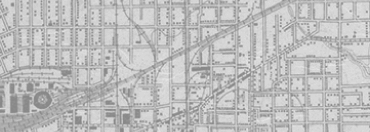


Back
Photograph of courtroom sketch of witness Dr. Martin Towler at Ruby trial
Photograph of courtroom pencil sketch on paper by CBS News courtroom artist Howard Brodie. The sketch shows witness Dr. Martin L. Towler during the Jack Ruby trial on March 10, 1964. The sketch shows witness Dr. Towler seated in the witness stand with a microphone positioned in front of him. In front of the witness stand is a seated man, likely a courtroom reporter, taking notes. Defense attorney Melvin Belli is standing on the left of the image looking at Dr. Towler. Handwritten captions in the upper right corner and the bottom right corner of the image respectively read "Dr. Towler" and "Belli / 3/10/64." Brodie made the original pencil sketches for CBS News during the trial of Jack Ruby after the judge barred cameras from the courtroom. Brodie then gave Joe Tonahill this photograph of a courtroom sketch as part of a collection of more than 40 in 1964.
Photograph of courtroom sketch of witness Dr. Martin Towler at Ruby trial
03/10/1964
Paper
14 5/8 × 19 3/8 in. (37.1 × 49.2 cm)
Tonahill Family Partners Collection/The Sixth Floor Museum at Dealey Plaza
2014.034.0022
Howard Brodie (1915-2010) was a sports artist for the San Francisco Chronicle when he enlisted in the U.S. Army with America's entry into World War II. He ultimately became one of the best-known sketch artists of the war, frequently published in the weekly U.S. military magazine, Yank, which ran from June 1942 to December 1945. After the war, Brodie spent the next thirty-five years as a courtroom artist, attending several notable trials including the Chicago Seven, Charles Manson and, of course, the Jack Ruby trial in 1964. For the Ruby trial, Brodie worked as a CBS-TV artist correspondent. Mr. Brodie recorded an oral history with the Museum in 2006. -- Stephen Fagin, Curator
Dr. Martin Lee Towler (1910-1993) was a founding member and onetime president of the American Medical Electroencephalographic Association. A native Texan, Towler was on the staff of the University of Texas branch hospital in Galveston at the time of the Jack Ruby trial. Although Towler was initially appointed by Judge Joe B. Brown as a neurological consultant, after Towler's report did not support the prosecution's case, he became a defense witness. Towler found "abnormalities" in Ruby's EEG charts, and he concluded that Ruby suffered from "a seizure disorder... of psychomotor variant." As Dr. Towler explained, someone suffering from this psychomotor epilepsy "can perform [their] ordinary everyday routine with a high degree of precision." However, he continued, the person would be "behaving as an automaton... Most patients will be amnesic for the entire episode..." -- Stephen Fagin, Curator

Photograph of courtroom sketch of witness Dr. Martin Towler at Ruby trial
Photograph of courtroom pencil sketch on paper by CBS News courtroom artist Howard Brodie. The sketch shows witness Dr. Martin L. Towler during the Jack Ruby trial on March 10, 1964. The sketch shows witness Dr. Towler seated in the witness stand with a microphone positioned in front of him. In front of the witness stand is a seated man, likely a courtroom reporter, taking notes. Defense attorney Melvin Belli is standing on the left of the image looking at Dr. Towler. Handwritten captions in the upper right corner and the bottom right corner of the image respectively read "Dr. Towler" and "Belli / 3/10/64." Brodie made the original pencil sketches for CBS News during the trial of Jack Ruby after the judge barred cameras from the courtroom. Brodie then gave Joe Tonahill this photograph of a courtroom sketch as part of a collection of more than 40 in 1964.
Photograph of courtroom sketch of witness Dr. Martin Towler at Ruby trial
03/10/1964
Photographs
Jack Ruby trial
Sketches
Witnesses
Trials
Artist
Artwork
Brodie, Howard
Belli, Melvin
Towler, Martin L., M.D.
CBS News
Dallas
Paper
14 5/8 × 19 3/8 in. (37.1 × 49.2 cm)
Tonahill Family Partners Collection/The Sixth Floor Museum at Dealey Plaza
2014.034.0022
Howard Brodie (1915-2010) was a sports artist for the San Francisco Chronicle when he enlisted in the U.S. Army with America's entry into World War II. He ultimately became one of the best-known sketch artists of the war, frequently published in the weekly U.S. military magazine, Yank, which ran from June 1942 to December 1945. After the war, Brodie spent the next thirty-five years as a courtroom artist, attending several notable trials including the Chicago Seven, Charles Manson and, of course, the Jack Ruby trial in 1964. For the Ruby trial, Brodie worked as a CBS-TV artist correspondent. Mr. Brodie recorded an oral history with the Museum in 2006. -- Stephen Fagin, Curator
Dr. Martin Lee Towler (1910-1993) was a founding member and onetime president of the American Medical Electroencephalographic Association. A native Texan, Towler was on the staff of the University of Texas branch hospital in Galveston at the time of the Jack Ruby trial. Although Towler was initially appointed by Judge Joe B. Brown as a neurological consultant, after Towler's report did not support the prosecution's case, he became a defense witness. Towler found "abnormalities" in Ruby's EEG charts, and he concluded that Ruby suffered from "a seizure disorder... of psychomotor variant." As Dr. Towler explained, someone suffering from this psychomotor epilepsy "can perform [their] ordinary everyday routine with a high degree of precision." However, he continued, the person would be "behaving as an automaton... Most patients will be amnesic for the entire episode..." -- Stephen Fagin, Curator









